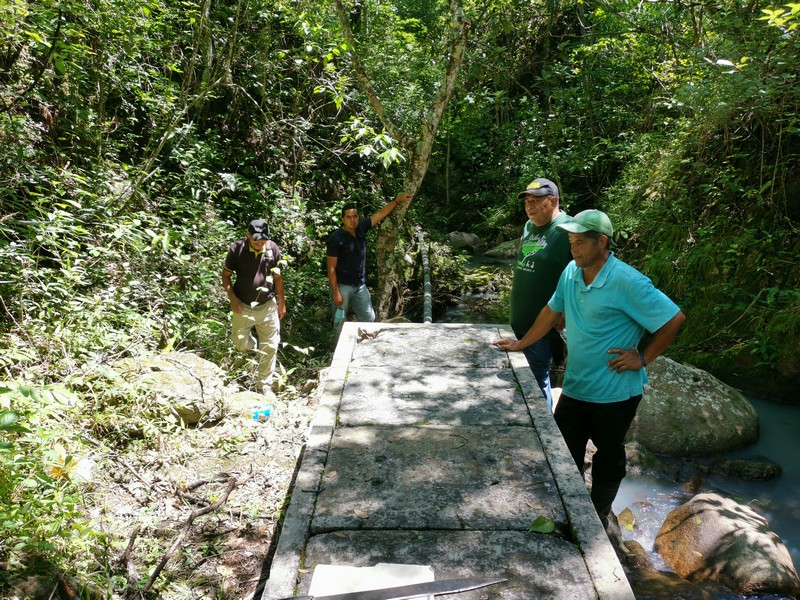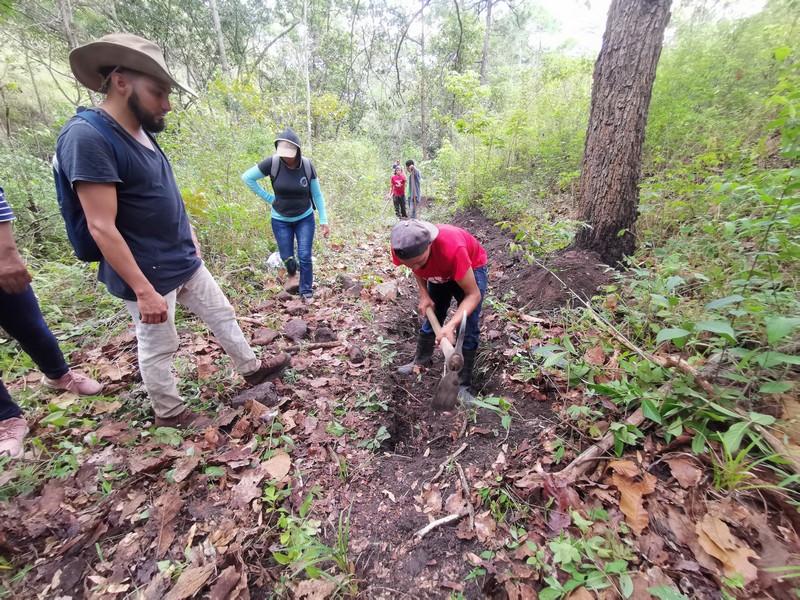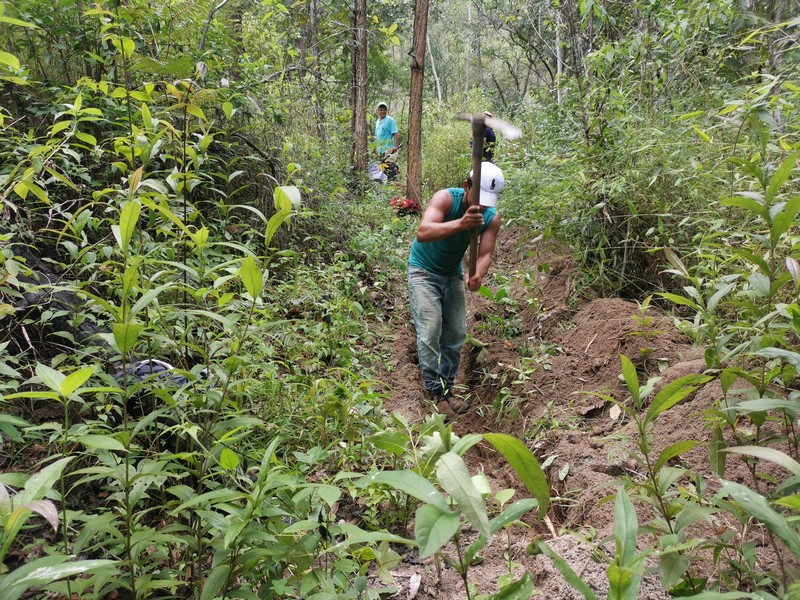El Paraiso Department, Guayabillas and Ojo de Agua communities (Municipality of Yuscarán), Plancitos 1 and Plancitos 2 communities (Municipality of Teupasenti), Honduras
In collaboration with

Start: Phase 1: April 1st, 2021; Phase 2: March 1st, 2022
Completion: Phase 1: September 30th, 2021; Phase 2: August 31st, 2022
Access to water and sanitation in impoverished rural communities in an area affected by repeated hurricanes. Environmental training for climate change mitigation. Rehabilitation of school sanitation and hygiene.
Objectives
- Reduction of diseases related to access to water, sanitation and hygiene in girls, boys and their families in the most vulnerable communities.
- Rehabilitate water systems and construct and rehabilitate sinks, toilets and water access facilities.
- Build and rehabilitate sanitation and hygiene facilities at the Guayabillas Educational Center.
- Empower communities for the sustainable management of water resources.
Beneficiaries
1,750 direct
545 children under 15 and 893 women.
3,917 indirect
1,305 children under 15 and 1,995 women.
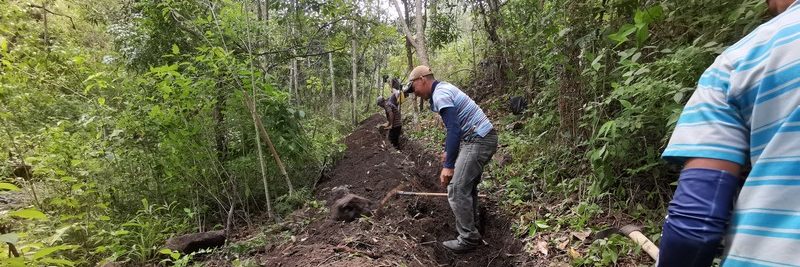
On the ground
The rural communities are impoverished and do not have water and sanitation infrastructure in an area affected by repeated extreme weather events. Need for environmental protection to mitigate climate impacts.
Honduras ha sido uno de los países más afectados por eventos climáticos extremos en los últimos 10 años (huracanes, inundaciones, sequías, etc). Además, las infraestructuras rurales de agua y saneamiento tienen deficiencias que, combinadas con dichos desastres naturales, hacen que las comunidades no cuenten con estos servicios de manera adecuada. Por otra parte, no cuentan con los recursos económicos suficientes para darle solución.
Las comunidades están comprometidas con la protección del medio ambiente, de sus recursos hídricos y en la mejora de sus hábitos de higiene ya que esto les permitirá reducir los impactos que estos eventos climáticos provocan en sus comunidades, y contribuirá en la reducción de la incidencia de enfermedades relativas al agua, saneamiento e higiene.
Durante noviembre de 2020 la fuerte intensidad de los huracanes Iota (Cat 5) y Eta (Cat 4) afectaron Centroamérica. En Honduras, uno de los departamentos más afectados fue El Paraíso, en donde se registraron desbordamiento de ríos y deslizamientos de terreno que afectaron a cultivos e infraestructuras. En la comunidad de Guayabillas, el sistema de abastecimiento de agua, que ya presentaba dificultades por su antigüedad (se construyó en los años 80 para menos población), resultó afectado. La tubería que toma el agua de la fuente, en la quebrada El Pacayal, y la línea de distribución del tanque de almacenamiento a las viviendas quedaron dañados por la violenta crecida.
Por otra parte, el sistema de abastecimiento de agua de las comunidades Plancitos 1 y Plancitos 2 en el municipio de Teupasenti tiene más de 40 años y ha quedado obsoleto. En términos de saneamiento básico, las comunidades, el centro educativo y el centro de salud no disponen de instalaciones adecuadas y esto afecta la salud, la higiene y la adecuada gestión de los recursos naturales.
Las comunidades del proyecto no cuentan con acceso a agua segura en calidad y cantidad suficiente que les permita garantizar un servicio con los estándares mínimos requeridos para los niños y niñas y sus familias. La misma situación se presenta en términos de acceso a saneamiento básico, en donde no todas las personas, incluidos los escolares que asisten al centro educativo y al centro de salud de Ojo de Agua cuentan con instalaciones adecuadas para saneamiento (seguras, privadas, con necesidades diferenciadas por género, movilidad limitada, etc.). Esto, acompañado de malos hábitos de higiene, genera riesgos en la salud de la población en general y por lo tanto aumenta su vulnerabilidad.
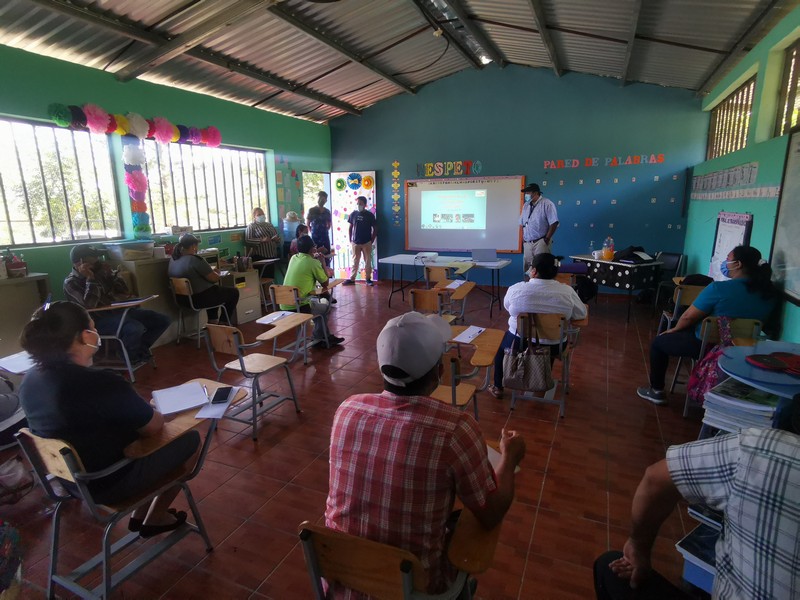
En detalle
El proyecto se basará en la rehabilitación de los sistemas de agua y la construcción y rehabilitación de lavabos e inodoros que beneficiarán directamente a 1.750 personas. Estas actividades de construcción estarán acompañadas por capacitaciones en el uso y mantenimiento de los sistemas, en promoción de la higiene y en la adecuada gestión integral de microcuencas, con el fin de asegurar la sostenibilidad de la intervención, así como procurar una adecuada entrega a las comunidades. Los gobiernos municipales y las comunidades beneficiarias aportaran los materiales de la zona, así como su mano de obra.
El proyecto apoyará a las comunidades a desarrollar planes de mitigación para reducir los efectos de los eventos climáticos extremos, así como a realizar acciones de protección de las microcuencas.
Se equipará a las familias con herramientas e insumos para la conservación del agua, y se promoverán prácticas y tecnologías de gestión que tienen como fin proteger, rehabilitar o mantener la integridad del ecosistema dentro de un área de captación definida. Algunas de estas prácticas pueden incluir la plantación de árboles nativos, control de la erosión, estabilización de taludes, y mejora en los sistemas de monitoreo y alerta temprana (a nivel hídrico y forestal).
En el año 1, se rehabilitará el sistema de agua en la comunidad de Guayabillas, el cual fue afectado por los huracanes Eta e Iota, lo que beneficiará a 130 familias. En el año 2, se rehabilitará el sistema de agua en Plancitos 1 y Plancitos 2, lo que beneficiará a 169 familias. Las obras de saneamiento beneficiarán a las familias más vulnerables de estas comunidades, a los niños y niñas de centros educativos y al centro de salud de Ojo de Agua.
Las Juntas gestoras de agua, saneamiento e higiene (ASH) a nivel comunitario, serán las encargadas de la organización de la comunidad para el aporte de mano de obra no cualificada y las capacitaciones en las diferentes temáticas de ASH.
En las capacitaciones se integrará a líderes de fe, como apoyo en la mejora de las prácticas desde el punto de vista religioso y comunitario. Se harán visitas de seguimiento por un técnico especializado, que brindará la asesoría técnica necesaria a las comunidades, garantizando así su apropiación y sostenibilidad.
El gobierno local se involucrará activamente en los planes de desarrollo comunitario, y apoyará la financiación de las obras como socio estratégico. Los niños y niñas se formarán para liderar y mantener prácticas que brinden desarrollo y bienestar a su comunidad.
Las obras civiles se realizarán bajo la gestión de profesionales y técnicos y siguiendo el Manual de construcción de letrinas y pozos de la Fundación We Are Water. Además, se cuenta con acuerdos de colaboración con los municipios y el Servicio Autónomo Nacional de Acueductos y Alcantarillados (SANAA), con apoyo técnico y financiero.
Para las capacitaciones, el proyecto involucra a diferentes actores comunitarios, lo que permitirá una mayor cobertura. Las Juntas administradoras de Agua y los líderes de fe se capacitarán en gestión de cuencas y formularán los planes de acción comunitaria para protección de estas. A nivel comunitario y escolar, se implementará la metodología Escuela y Casa Saludable (ESCASAL) para promoción de la higiene, salud y saneamiento ambiental, comunitario y escolar. En los centros educativos se utilizará la metodología Limpios y Felices (Sesame WASH UP!) que promueve buenas prácticas en ASH, de forma didáctica e interactiva.
Perspectivas de sostenibilidad
La metodología participativa da a la población herramientas para generar sostenibilidad y apropiación de las iniciativas de desarrollo, lo que a su vez facilitará el empoderamiento comunitario y de las mujeres, niñas y niños para la gestión territorial, incluida la gestión de los recursos hídricos. Esto les permitirá generar espacios en donde toda la comunidad pueda expresar sus opiniones e ideas para presentar propuestas en pro de la mejora común y para la toma de decisiones.
La participación de los líderes de fe tiene es importante en el cambio de comportamientos y prácticas debido a la confianza, apoyo y seguridad que generan en las comunidades. La participación de las niñas y los niños en todas las fases del proyecto, les permite aumentar sus capacidades y ser actores clave dentro y fuera de sus comunidades.
Como parte de la estrategia de trabajo, nuestro colaborador, World Vision Honduras, cuenta con acuerdos de colaboración y relación con municipios, agencias gubernamentales como SANAA, comunidades y otros actores clave.
En los municipios y aldeas de Yuscarán y Teupasenti, existe un acompañamiento de programas de patrocinio y otros proyectos, que permite obtener recursos (técnicos, financieros, mano de obra, etc.) junto a estos actores comunitarios.
Las comunidades tienen comités o juntas de agua conformadas, que lideran la gestión hídrica. Estas juntas definen las tarifas para el mantenimiento de los sistemas (insumos, fontanería, etc.) y los procesos de formación comunitaria que permiten alcanzar cambios de comportamiento, y garantizan la sostenibilidad.
El proyecto permitirá que todos los sistemas a construir y rehabilitar cuenten con todos los elementos necesarios para su adecuado funcionamiento y dará acompañamiento técnico para que las comunidades tengan la capacidad de mantenerlo adecuadamente. La capacitación de todas las organizaciones de base comunitarias facilitará que los procesos de apropiación y sostenibilidad de las infraestructuras y de la adecuada gestión de las cuencas sean pertinentes en cada una de las comunidades.


